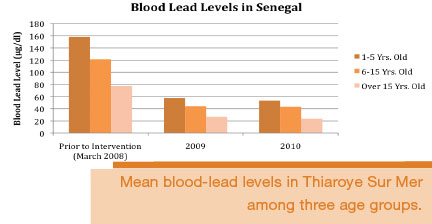Used Lead-Acid Battery Recycling
Dakar Senegal
In March 2008, Blacksmith Institute was contacted about the death of 18 children under age five in the neighborhood of Thiaroye Sur Mer in Dakar, Senegal. These children all died from acute lead poisoning due to consistent exposure to lead dust in the air, soil and water. The source of lead exposure was quickly determined to be the informal recycling and disposal of ULABs. This practice was a popular way to supplement domestic income, and was typically undertaken by the women of the community. Because this activity was taking place in an informal, domestic setting, the practice was unregulated, often in open-air settings, and exposed some 40,000 people to lead dust.
Upon learning of the death of the 18 children, the Senegalese government worked to shut down these illegal lead battery-smelting operations. Blacksmith Institute staff tested the blood-lead levels of 41 children. 100% of the children had blood-lead levels over 10 μg/dL, with several over 150 μg/dL. The World Health Organization states that any test indicating a blood-lead level over 70 μg/dL in children is cause for the declaration of a medical emergency.
Project Strategies
This project has engaged Blacksmith Institute, the Senegalese government, the University of Dakar’s Toxicology department, as well as the Senegalese Ministry of Health. The latter two partners have developed an educational program in conjunction with local religious and village authorities to convey the dangers and potential persistence of exposure to lead. On a medical level, the World Health Organization has already committed to treating those who have already been exposed, and the local government has initiated remediation efforts to treat the soil with funding from Blacksmith Institute and other partners. Policy changes are also in effect that are aimed at eliminating the market for informal ULAB recycling by better regulating battery collection, transportation, storage, and recycling practices. The Senegalese Department of Women’s Affairs is also working to develop alternate sources of income, helping to reduce the economic incentive to turn toward informal ULAB recycling.
Outcomes and Follow-Up
Following the intervention by Blacksmith Institute and its local partners, the contaminated area has now been remediated. Soil lead concentrations have been drastically reduced from the extreme highs of 400,000 ppm, or 40% lead. While children between the ages of 1 and 5 exhibited blood-lead levels in excess of 150 μg/dL in early 2008, the average blood-lead level in that age group has been reduced to 53.5 μg/dL with the downward trend continuing. Similar decreases were seen across other age groups, pointing to an overall downward trend in blood-lead levels across the board--a significant achievement in a community that was previously in danger of experiencing widespread lead poisoning.

Over 2,500 cubic meters of impacted soil were removed during this project by local contractors and community labor under direct supervision of the Ministry of the Environment and Blacksmith Institute technical experts. Local women who were trained and guided by Blacksmith Technical Advisory Board members have decontaminated more than 80 homes.
The final phase of cleanup is now complete, and the blood-lead levels of children will continue to be monitored. In addition, a new ULAB collection center has been constructed, and is now being used to manage batteries in a safe manner.



